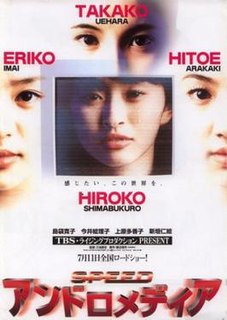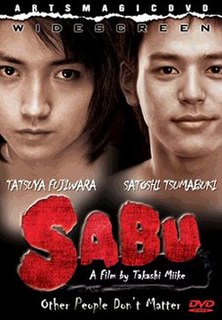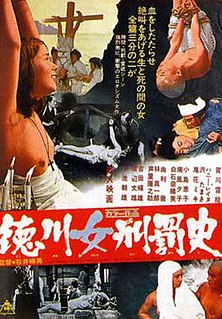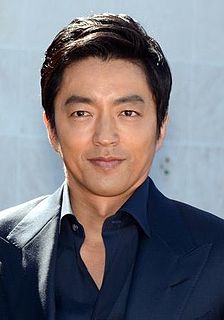
Perfect Blue is a 1997 Japanese animated psychological thriller film directed by Satoshi Kon and written by Sadayuki Murai. It is based on the novel Perfect Blue: Complete Metamorphosis by Yoshikazu Takeuchi. The film stars the voices of Junko Iwao, Rica Matsumoto, Shiho Niiyama, Masaaki Okura, Shinpachi Tsuji and Emiko Furukawa.

Kiyoshi Kurosawa is a Japanese film director, screenwriter, film critic and a professor at Tokyo University of the Arts. Although he has worked in a variety of genres, Kurosawa is best known for his many contributions to the Japanese horror genre.

Satoshi Kon was a Japanese film director, animator, screenwriter and manga artist from Sapporo, Hokkaidō and a member of the Japanese Animation Creators Association (JAniCA). He was a graduate of the Graphic Design department of the Musashino Art University.

Kōji Hashimoto, known professionally as Kōji Yakusho, is a Japanese actor.

Audition is a 1999 Japanese horror film directed by Takashi Miike, based on the 1997 novel by Ryu Murakami. It is about a widower, Shigeharu Aoyama, whose son suggests that he should find a new wife. Aoyama agrees, and with a friend, stages a phony audition to meet a potential new partner in life. After interviewing several women, Aoyama becomes interested in Asami, who responds well to him, although as they begin to date, her dark past begins to affect their relationship.

Millennium Actress is a 2002 Japanese animated drama film co-written and directed by Satoshi Kon and produced by Madhouse. Loosely based on the lives of actresses Setsuko Hara and Hideko Takamine, it tells the story of two documentary filmmakers investigating the life of a retired acting legend. As she tells them the story of her life, the difference between reality and cinema becomes blurred.

Visitor Q is a 2001 Japanese black comedy pornographic horror film directed by Takashi Miike. It was filmed as the sixth and final part of the Love Cinema series consisting of six straight-to-video releases by independent filmmakers via a brief but exclusive run at the minuscule Shimokitazawa cinema in Tokyo. The six films were conceived as low budget exercises to explore the benefits afforded by the low-cost digital video medium such as the increased mobility of the camera and the low-lighting conditions available to the filmmakers.

Gozu is a 2003 Japanese horror comedy crime film directed by Takashi Miike and written by Sakichi Sato.
Anne Suzuki is a Japanese actress.

Andromedia (アンドロメディア) is a 1998 Japanese film directed by Takashi Miike. featuring the Japanese musical groups Speed and Da Pump.

Sabu is a 2002 Japanese film directed by Takashi Miike and adapted from the classic Japanese rite-of-passage novel by Shūgorō Yamamoto.

The Kuroshakai trilogy, also known as the Black Society trilogy, is a series of films directed by Japanese filmmaker Takashi Miike involving Chinese triads and Japanese yakuza.

Nao Ōmori, sometimes credited as Nao Ohmori or Nao Omori, is a Japanese actor. He was given the Best Supporting Actor award at the 2004 Yokohama Film Festival.

Shogun's Joys of Torture is a 1968 Japanese ero guro film directed by Teruo Ishii and distributed by Toei. The film, which can be classified as belonging to a subgenre of pink films, is considered a precursor to Toei's ventures into the "pinky violent" style of filmmaking seen in the early 1970s. It was followed by Shogun's Sadism in 1976.
Mitsuki Tanimura is a Japanese actress.

Takao Osawa is a Japanese actor.

13 Assassins is a 2010 samurai film directed by Takashi Miike; it is a remake of Eiichi Kudo's 1963 Japanese period drama film 13 Assassins. Loosely based on historical events, the Miike version is set in 1844 toward the end of the Edo period where a group of thirteen assassins—comprising twelve samurai and a hunter—secretly plot to assassinate the savage leader of the Akashi clan, Lord Matsudaira Naritsugu, to thwart his appointment to the powerful Shogunate Council.
Dora-heita is a 2000 Japanese film by Director Kon Ichikawa. It was the 74th film made by Ichikawa.
Mark Schilling is an American film critic, journalist, translator, and author based in Tokyo, Japan. He has written for The Japan Times, Variety, and Screen International.




















